UST
-
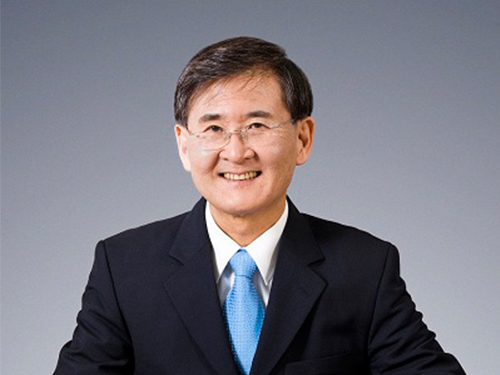 ISCN and GULF Share Best Practices Report
The International Sustainable Campus Network (ISCN) and the Global University Leaders Forum (GULF) co-hosted a conference at the 2016 World Economic Forum held on January 20-23, 2016 in Davos, Switzerland, to present exemplary campus sustainability case studies provided by the world’s leading universities.
A total of 20 universities, including KAIST, Harvard University, University of Oxford, Yale University, the National University of Singapore, the Hong Kong University of Science and Technology, and the Swiss Federal Institute of Technology (Zurich), reported on their endeavors to demonstrate sustainable development in higher education in three different panels at the conference: Developing Skills and Building Capacities, Collaborating to Catalyze Change, and Innovating for Efficient Built Environments.
President Sung-Mo Kang of KAIST gave a presentation on the Saudi Aramco-KAIST CO2 Management Center as a sustainable development model for KAIST.
KAIST and Saudi Aramco, the world’s leading fossil-fuel provider, joined forces in 2013 to establish a joint research center on the reduction and management of carbon dioxide (CO2) emissions, a major driver of climate change.
The research center, located at the KAIST campus in Daejeon, South Korea, is currently sponsoring ten research projects involving more than 20 doctoral-level researchers and over 100 students.
The goal of the center is to develop materials for more energy-efficient CO2 capture, catalysts and processes for converting CO2 into valuable products, novel storage methods, and system-level analyses of major CO2 emitting industries to suggest industry-specific CO2 reduction strategies including energy efficiency improvement.
The center’s work also includes analyzing the impact of potential government or industry-wide policies in the face of uncertainties, some of which are technological and economic as well as political. Besides its research activities, the center has also sponsored seminars and workshops throughout the year to raise awareness of the importance of CO2 management in building a sustainable future.
President Kang said that, from the beginning, the center has prompted researchers and students with different academic backgrounds and skill sets to work together to find integrative and systematic solutions to address real problems of critical importance to the world’s sustainability.
ISCN is a global non-profit association of leading colleges and universities representing over 20 countries, working together to holistically integrate sustainability into campus operations, research, and teaching. As of now, more 75 universities worldwide are the members of ISCN.
The GULF is composed of the presidents of the top 25 universities in the world. The World Economic Forum created it in 2006 to offer a non-competitive platform for high-level dialogue in academia. KAIST is the only Korean GULF member.
For the full report of the 2016 ISCN and GULF conference, go to http://www.international-sustainable-campus-network.org/downloads/general/441-2016-iscn-gulf-best-practice-report/file.
2016.01.25 View 11158
ISCN and GULF Share Best Practices Report
The International Sustainable Campus Network (ISCN) and the Global University Leaders Forum (GULF) co-hosted a conference at the 2016 World Economic Forum held on January 20-23, 2016 in Davos, Switzerland, to present exemplary campus sustainability case studies provided by the world’s leading universities.
A total of 20 universities, including KAIST, Harvard University, University of Oxford, Yale University, the National University of Singapore, the Hong Kong University of Science and Technology, and the Swiss Federal Institute of Technology (Zurich), reported on their endeavors to demonstrate sustainable development in higher education in three different panels at the conference: Developing Skills and Building Capacities, Collaborating to Catalyze Change, and Innovating for Efficient Built Environments.
President Sung-Mo Kang of KAIST gave a presentation on the Saudi Aramco-KAIST CO2 Management Center as a sustainable development model for KAIST.
KAIST and Saudi Aramco, the world’s leading fossil-fuel provider, joined forces in 2013 to establish a joint research center on the reduction and management of carbon dioxide (CO2) emissions, a major driver of climate change.
The research center, located at the KAIST campus in Daejeon, South Korea, is currently sponsoring ten research projects involving more than 20 doctoral-level researchers and over 100 students.
The goal of the center is to develop materials for more energy-efficient CO2 capture, catalysts and processes for converting CO2 into valuable products, novel storage methods, and system-level analyses of major CO2 emitting industries to suggest industry-specific CO2 reduction strategies including energy efficiency improvement.
The center’s work also includes analyzing the impact of potential government or industry-wide policies in the face of uncertainties, some of which are technological and economic as well as political. Besides its research activities, the center has also sponsored seminars and workshops throughout the year to raise awareness of the importance of CO2 management in building a sustainable future.
President Kang said that, from the beginning, the center has prompted researchers and students with different academic backgrounds and skill sets to work together to find integrative and systematic solutions to address real problems of critical importance to the world’s sustainability.
ISCN is a global non-profit association of leading colleges and universities representing over 20 countries, working together to holistically integrate sustainability into campus operations, research, and teaching. As of now, more 75 universities worldwide are the members of ISCN.
The GULF is composed of the presidents of the top 25 universities in the world. The World Economic Forum created it in 2006 to offer a non-competitive platform for high-level dialogue in academia. KAIST is the only Korean GULF member.
For the full report of the 2016 ISCN and GULF conference, go to http://www.international-sustainable-campus-network.org/downloads/general/441-2016-iscn-gulf-best-practice-report/file.
2016.01.25 View 11158 -
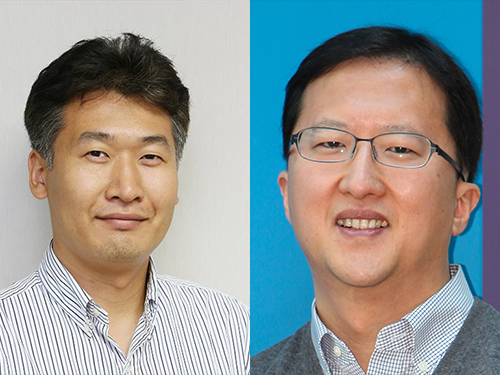 Professors Jeon and Choi Receive the Young Scientist Award
Professors Seokwoo Jeon of the Department of Materials Science and Engineering and Jang Wook Choi of the Graduate School of Energy, Environment, Water and Sustainability (EEWS) at KAIST received the Young Scientist Award.
The award ceremony took place at the Korea Press Center in Seoul. Presented by the Ministry of Science, ICT and Future Planning of Korea and the National Academy of Engineering of Korea, the Young Scientist Award is given to outstanding scientists under the age of 40 who have demonstrated excellence in their research in the field of natural science.
Each year the award is given to three scientists in different areas.
Professor Jeon was recognized for his achievement in creating a new property of materials. He studied synthesis and development of low-dimensional nanomaterials and developed a large area nanostructure.
Professor Choi’s research area was to discover optimal materials for rechargeable batteries. By applying his research, he developed rechargeable batteries with high efficiency, making the wearable system more feasible.
2016.01.11 View 13913
Professors Jeon and Choi Receive the Young Scientist Award
Professors Seokwoo Jeon of the Department of Materials Science and Engineering and Jang Wook Choi of the Graduate School of Energy, Environment, Water and Sustainability (EEWS) at KAIST received the Young Scientist Award.
The award ceremony took place at the Korea Press Center in Seoul. Presented by the Ministry of Science, ICT and Future Planning of Korea and the National Academy of Engineering of Korea, the Young Scientist Award is given to outstanding scientists under the age of 40 who have demonstrated excellence in their research in the field of natural science.
Each year the award is given to three scientists in different areas.
Professor Jeon was recognized for his achievement in creating a new property of materials. He studied synthesis and development of low-dimensional nanomaterials and developed a large area nanostructure.
Professor Choi’s research area was to discover optimal materials for rechargeable batteries. By applying his research, he developed rechargeable batteries with high efficiency, making the wearable system more feasible.
2016.01.11 View 13913 -
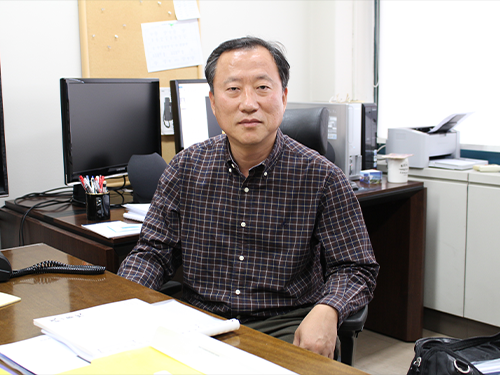 Professor Tae-Eog Lee Receives December's Scientist of the Month Award by the Korean Government
Professor Tae-Eog Lee of the Industrial and Systems Engineering at KAIST received the Scientist of the Month Award for December 2015. The award is sponsored by the Ministry of Science, ICT and Future Planning of Korea, which was hosted by the National Research Foundation of Korea.
The award recognizes Professor Lee’s efforts to advance the field of semiconductor device fabrication processing. This includes the development of the most efficient scheduling and controlling of cluster tools. He also created mathematical solutions to optimize the complicated cycle time of cluster tools in semiconductor manufacturing and the process of robot task workload.
Professor Lee contributed to the formation of various discrete event systems and automation systems based on his mathematical theories and solutions and advanced a scheduling technology for the automation of semiconductor production.
He has published 18 research papers in the past three years and has pioneered to develop Korean tool schedulers through the private sector-university cooperation.
2015.12.10 View 9014
Professor Tae-Eog Lee Receives December's Scientist of the Month Award by the Korean Government
Professor Tae-Eog Lee of the Industrial and Systems Engineering at KAIST received the Scientist of the Month Award for December 2015. The award is sponsored by the Ministry of Science, ICT and Future Planning of Korea, which was hosted by the National Research Foundation of Korea.
The award recognizes Professor Lee’s efforts to advance the field of semiconductor device fabrication processing. This includes the development of the most efficient scheduling and controlling of cluster tools. He also created mathematical solutions to optimize the complicated cycle time of cluster tools in semiconductor manufacturing and the process of robot task workload.
Professor Lee contributed to the formation of various discrete event systems and automation systems based on his mathematical theories and solutions and advanced a scheduling technology for the automation of semiconductor production.
He has published 18 research papers in the past three years and has pioneered to develop Korean tool schedulers through the private sector-university cooperation.
2015.12.10 View 9014 -
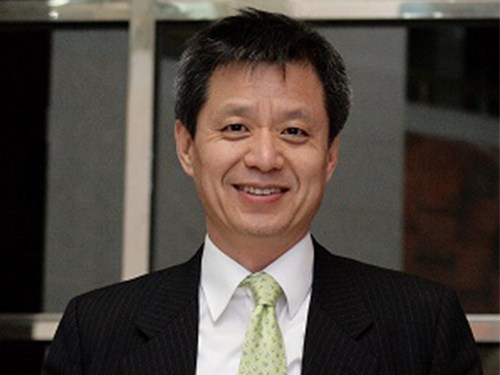 Professor Duck-Joo Lee Receives the Achievement Award in the Asian-Australian Rotorcraft Forum 2015
Professor Duck-Joo Lee of the Aerospace Engineering Department at KAIST received the achievement award in ARF (Asian-Australian Rotorcraft Forum) 2015. In ARF, companies such as Bell Helicopter and Airbus Helicopter gather and share their technological discoveries.
Professor Lee was elected as Chairman of the first ARF to oversee the organization of its forum as well as exhibitions, and his effort towards advancing rotorcraft was recognized.
Professor Lee said, “I hope that research findings of many scholars will be applied to the domestic air transportation businesses.” He added, “More companies in the field should enter the global market.”
Professor Lee started his career as a researcher in NASA Ames Research Center. He is an expert in the fields of jet engines and aeroacoustics.
2015.12.08 View 8041
Professor Duck-Joo Lee Receives the Achievement Award in the Asian-Australian Rotorcraft Forum 2015
Professor Duck-Joo Lee of the Aerospace Engineering Department at KAIST received the achievement award in ARF (Asian-Australian Rotorcraft Forum) 2015. In ARF, companies such as Bell Helicopter and Airbus Helicopter gather and share their technological discoveries.
Professor Lee was elected as Chairman of the first ARF to oversee the organization of its forum as well as exhibitions, and his effort towards advancing rotorcraft was recognized.
Professor Lee said, “I hope that research findings of many scholars will be applied to the domestic air transportation businesses.” He added, “More companies in the field should enter the global market.”
Professor Lee started his career as a researcher in NASA Ames Research Center. He is an expert in the fields of jet engines and aeroacoustics.
2015.12.08 View 8041 -
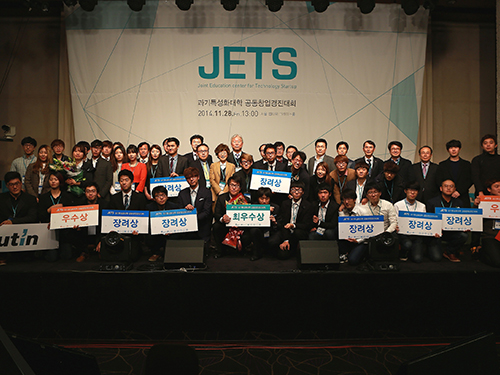 KAIST and Four Science and Technology Universities Host a Start-up Competition
KAIST and four other science and technology universities, such as Gwangju Institute of Science and Technology (GIST), Ulsan National Institute of Science and Technology (UNIST), Daegu Gyeongbuk Institute of Science and Technology (DGIST), and Pohang University of Science and Technology (POSTECH), hosted a startup competition on November 27, 2015 at the Dongdaemun Design Plaza in Seoul.
Approximately 150 participants including students from the five universities, "angel" investors, and entrepreneurs attended the competition.
The competition was held to promote startups that are based on research achievements in science and technology and to foster entrepreneurs with great potential.
Two hundred and sixty applicants from 81 teams competed this year. Only ten teams made it to the finals.
KAIST students presented two business plans: an experience-centered education platform and mobile taxi-pooling service. Students from other universities presented a brain-stimulating simulation software (GIST), handy smart health trainer (GIST), real-time reporting system for luggage (DGIST), a flower delivery system (UNIST), surveillance and alarm system for stock-related events via machinery studies (UNIST), augmented emotion toys using augmented reality (POSTECH), and a nasal spray for fine dust prevention (POSTECH).
KAIST also displayed an exhibition of “wearable haptic device for multimedia contents” and “next generation recommendation service platform based on one-on-one matching system with high expandability and improved user experience system.”
The winning team received an award from the Minister of Science, ICT and Future Planning of Korea, as well as an opportunity to participate in overseas startup programs over the course of ten days.
Joongmyeon Bae, Director of the KAIST Industry and University Cooperation, who organized the contest, said, “The alumni of Stanford University (USA) has annually created over 5.4 million jobs through startup activities. Likewise, we hope that our event will contribute to job creation by fostering innovative entrepreneurs.”
2015.11.26 View 12913
KAIST and Four Science and Technology Universities Host a Start-up Competition
KAIST and four other science and technology universities, such as Gwangju Institute of Science and Technology (GIST), Ulsan National Institute of Science and Technology (UNIST), Daegu Gyeongbuk Institute of Science and Technology (DGIST), and Pohang University of Science and Technology (POSTECH), hosted a startup competition on November 27, 2015 at the Dongdaemun Design Plaza in Seoul.
Approximately 150 participants including students from the five universities, "angel" investors, and entrepreneurs attended the competition.
The competition was held to promote startups that are based on research achievements in science and technology and to foster entrepreneurs with great potential.
Two hundred and sixty applicants from 81 teams competed this year. Only ten teams made it to the finals.
KAIST students presented two business plans: an experience-centered education platform and mobile taxi-pooling service. Students from other universities presented a brain-stimulating simulation software (GIST), handy smart health trainer (GIST), real-time reporting system for luggage (DGIST), a flower delivery system (UNIST), surveillance and alarm system for stock-related events via machinery studies (UNIST), augmented emotion toys using augmented reality (POSTECH), and a nasal spray for fine dust prevention (POSTECH).
KAIST also displayed an exhibition of “wearable haptic device for multimedia contents” and “next generation recommendation service platform based on one-on-one matching system with high expandability and improved user experience system.”
The winning team received an award from the Minister of Science, ICT and Future Planning of Korea, as well as an opportunity to participate in overseas startup programs over the course of ten days.
Joongmyeon Bae, Director of the KAIST Industry and University Cooperation, who organized the contest, said, “The alumni of Stanford University (USA) has annually created over 5.4 million jobs through startup activities. Likewise, we hope that our event will contribute to job creation by fostering innovative entrepreneurs.”
2015.11.26 View 12913 -
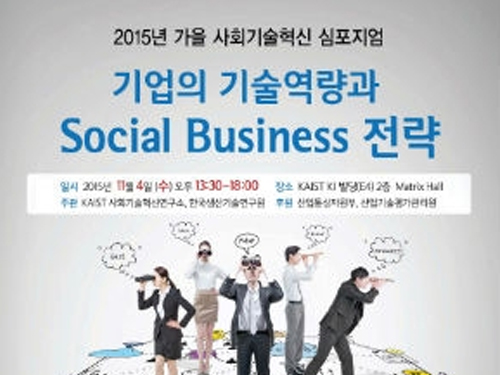 KAIST Invites Entrepreneurs and Experts to Participate in a Social Technology Innovation Symposium
The Research Institute for Social Technology and Innovation (RISTI) at KAIST hosted the Social Technology Innovation Symposium on November 4, 2015 in KI building, to which 100 social business entrepreneurs and experts in the field were invited.
Social businesses refer to activities of companies, which strive to resolve social problems such as environmental issues, income inequality, and aging societies while seeking profit at the same time. This is different from companies taking social responsibility and non-profit organization serving the community in that they attempt to solve social problems through a sustainable business model.
Held under the theme of “technology capabilities of companies and social business strategies,” this symposium was the first to gather representatives from social venture companies, medium-sized enterprises, and major companies at one place to share their experiences in a social business and to discuss future tasks.
The symposium was divided into sessions with three different topics ranging from social business strategies using information technology, a social business and its business model, and social business strategies of major companies.
The symposium started with keynote speeches delivered by Professor HongKyu Lee, RISTI, and Professor Hong-Tak Lim, RISTI, who discussed the role of technology in a social business. It was followed by plenary sessions led by CEOs who are running social businesses such as the Sharing and Technologies Incorporated Project, Simwon Technology, Ecojun Company, Underdogs, and the Farming Fund as well as by representatives from a social responsibility section of CJ management team and the social responsibility council of SK. In the future, these talks will serve as a medium to share their experiences in social businesses and to discuss the role of technology in the business. Some talks touched upon topics such as development of platforms for social innovation, social businesses employing disabled workers, and crowd funding for farming.
The Director of RISTI, Professor HongKyu Lee said, “The symposium will be the first to have people from leading companies in social businesses in Korea in one place.” He added, “This will be a great opportunity for anyone to know what will be the future of social businesses, which were created to solve the social problems caused by capitalism.”
The symposium was sponsored by the Ministry of Trade, Industry, and Energy of Korea.
2015.10.30 View 10265
KAIST Invites Entrepreneurs and Experts to Participate in a Social Technology Innovation Symposium
The Research Institute for Social Technology and Innovation (RISTI) at KAIST hosted the Social Technology Innovation Symposium on November 4, 2015 in KI building, to which 100 social business entrepreneurs and experts in the field were invited.
Social businesses refer to activities of companies, which strive to resolve social problems such as environmental issues, income inequality, and aging societies while seeking profit at the same time. This is different from companies taking social responsibility and non-profit organization serving the community in that they attempt to solve social problems through a sustainable business model.
Held under the theme of “technology capabilities of companies and social business strategies,” this symposium was the first to gather representatives from social venture companies, medium-sized enterprises, and major companies at one place to share their experiences in a social business and to discuss future tasks.
The symposium was divided into sessions with three different topics ranging from social business strategies using information technology, a social business and its business model, and social business strategies of major companies.
The symposium started with keynote speeches delivered by Professor HongKyu Lee, RISTI, and Professor Hong-Tak Lim, RISTI, who discussed the role of technology in a social business. It was followed by plenary sessions led by CEOs who are running social businesses such as the Sharing and Technologies Incorporated Project, Simwon Technology, Ecojun Company, Underdogs, and the Farming Fund as well as by representatives from a social responsibility section of CJ management team and the social responsibility council of SK. In the future, these talks will serve as a medium to share their experiences in social businesses and to discuss the role of technology in the business. Some talks touched upon topics such as development of platforms for social innovation, social businesses employing disabled workers, and crowd funding for farming.
The Director of RISTI, Professor HongKyu Lee said, “The symposium will be the first to have people from leading companies in social businesses in Korea in one place.” He added, “This will be a great opportunity for anyone to know what will be the future of social businesses, which were created to solve the social problems caused by capitalism.”
The symposium was sponsored by the Ministry of Trade, Industry, and Energy of Korea.
2015.10.30 View 10265 -
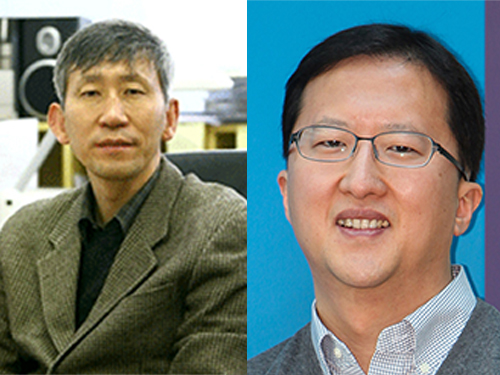 Professors Sukbok Chang and Jang-Wook Choi Receive the 2015 Knowledge Award from the Korean Government
The Ministry of Science, ICT and Future Planning (MISP) of the Republic of Korea announced the 2015 Knowledge Awards on October 20, 2015. Two KAIST professors received the award.
Established in 2009, the awards are presented to Korean scientists whose publications have contributed to the international science community. Specifically, the MISP used the two biggest science databases, Science Citation Index Expanded (SCIE) and Scopus, to identify ten highly cited papers ranked in the top 1% by total citations in the past ten years.
Professor Sukbok Chang of Chemistry (left in the picture below) is a global authority in the field of catalytic hydrocarbon functionalization. His paper entitled “Palladium-catalyzed C-H Functionalization of Pyridine N-Oxides: Highly Selective Alkenylation and Direct Arylation with Unactivated Arenes,” which was published in the Journal of the American Chemical Society in 2008, was once selected by Thomson Reuters as one of the “Most Influential Research Papers of the Month.” In 2011, the American Chemical Society included his paper in the list of the top 20 research papers that were most frequently cited in the last three years.
Professor Jang-Wook Choi of the Graduate School of EEWS (Energy, Environment, Water, and Sustainability) has been known for his leading research in rechargeable battery, supercapacitor, and materials chemistry. In particular, his work on secondary fuel cells attracted significant attention from academia and industry in Korea. Professor Choi developed a super-thin flexible lithium-ion battery this year, thinner than a credit card, which lasts longer than the existing batteries and with greater performance. He also developed new electrode materials for next-generation sodium-ion and magnesium secondary fuel cells.
Professor Sukbok Chang (left) and Professor Jang-Wook Choi (right)
2015.10.23 View 14136
Professors Sukbok Chang and Jang-Wook Choi Receive the 2015 Knowledge Award from the Korean Government
The Ministry of Science, ICT and Future Planning (MISP) of the Republic of Korea announced the 2015 Knowledge Awards on October 20, 2015. Two KAIST professors received the award.
Established in 2009, the awards are presented to Korean scientists whose publications have contributed to the international science community. Specifically, the MISP used the two biggest science databases, Science Citation Index Expanded (SCIE) and Scopus, to identify ten highly cited papers ranked in the top 1% by total citations in the past ten years.
Professor Sukbok Chang of Chemistry (left in the picture below) is a global authority in the field of catalytic hydrocarbon functionalization. His paper entitled “Palladium-catalyzed C-H Functionalization of Pyridine N-Oxides: Highly Selective Alkenylation and Direct Arylation with Unactivated Arenes,” which was published in the Journal of the American Chemical Society in 2008, was once selected by Thomson Reuters as one of the “Most Influential Research Papers of the Month.” In 2011, the American Chemical Society included his paper in the list of the top 20 research papers that were most frequently cited in the last three years.
Professor Jang-Wook Choi of the Graduate School of EEWS (Energy, Environment, Water, and Sustainability) has been known for his leading research in rechargeable battery, supercapacitor, and materials chemistry. In particular, his work on secondary fuel cells attracted significant attention from academia and industry in Korea. Professor Choi developed a super-thin flexible lithium-ion battery this year, thinner than a credit card, which lasts longer than the existing batteries and with greater performance. He also developed new electrode materials for next-generation sodium-ion and magnesium secondary fuel cells.
Professor Sukbok Chang (left) and Professor Jang-Wook Choi (right)
2015.10.23 View 14136 -
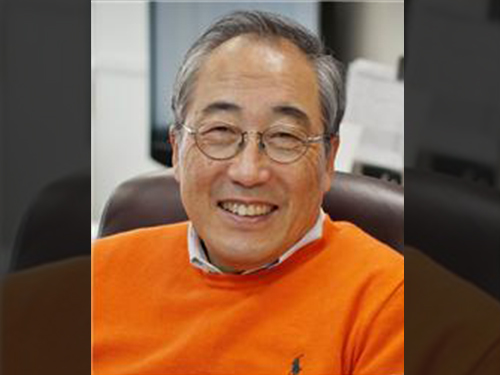 Yang-Hann Kim named recipient of the Rossing Prize in Acoustics Education by the Acoustical Society of America
Courtesy of the Acoustical Society of America (ASA)
Press release issued by ASA on October 8, 2015:
Yang-Hann Kim named recipient of the Rossing Prize in Acoustics Education by the Acoustical Society of America
Melville (NY), 8 October 2015—Yang-Hann Kim, Professor at KAIST (Korea Advanced Institute of Science and Technology), Daejeon, has been named recipient of the Acoustical Society of America (ASA) Rossing Prize in Acoustics Education. The Rossing Prize is awarded to an individual who has made significant contributions toward furthering acoustics education through distinguished teaching, creation of educational materials, textbook writing and other activities. The Prize will be presented at the 170th meeting of the ASA on 4 November 2015 in Jacksonville, Florida.
“It is my great honor to receive the Rossing Prize, which has been given to outstanding scholar members of ASA since 2003. I never dreamed to be one of them.” said Kim. “I must express my deep respect and love to my friend Thomas Rossing: I have known him more than 20 years, always respect what he has done for teaching, writing books, and pioneering work in musical acoustics.”
Yang-Hann Kim is a Fellow of the Acoustical Society of America. He received a Ph.D. from the Massachusetts Institute of Technology. His main research interests in acoustics began with “sound visualization” resulted in the development of the “sound camera” which makes any sound visible instantly. Then he moved to “sound manipulation.” Using his manipulation technology, one can move any sound in space and time, positioning sound, and can create a private sound zone. Sound Visualization and Manipulation, (Wiley, 2013), summarizes these two fields. Dr. Kim’s textbook, Sound Propagation: An Impedance Based Approach (John Wiley and Sons, 2010), is well acknowledged by the associated professional communities as one of best acoustics textbooks. Using his teaching experience at KAIST, he created a YouTube lecture on acoustics and vibration which is also available in MOOC (Massive Open Online Course). He has also presented lectures to over 500 engineers and technicians for the past 30 years.
###
The Acoustical Society of America (ASA) is the premier international scientific society in acoustics devoted to the science and technology of sound. Its 7000 members worldwide represent a broad spectrum of the study of acoustics. ASA publications include the Journal of the Acoustical Society of America—the world’s leading journal on acoustics, Acoustics Today magazine, books, and standards on acoustics. The Society also holds two major scientific meetings per year. For more information about the Society visit our website, www.acousticalsociety.org.
2015.10.06 View 11183
Yang-Hann Kim named recipient of the Rossing Prize in Acoustics Education by the Acoustical Society of America
Courtesy of the Acoustical Society of America (ASA)
Press release issued by ASA on October 8, 2015:
Yang-Hann Kim named recipient of the Rossing Prize in Acoustics Education by the Acoustical Society of America
Melville (NY), 8 October 2015—Yang-Hann Kim, Professor at KAIST (Korea Advanced Institute of Science and Technology), Daejeon, has been named recipient of the Acoustical Society of America (ASA) Rossing Prize in Acoustics Education. The Rossing Prize is awarded to an individual who has made significant contributions toward furthering acoustics education through distinguished teaching, creation of educational materials, textbook writing and other activities. The Prize will be presented at the 170th meeting of the ASA on 4 November 2015 in Jacksonville, Florida.
“It is my great honor to receive the Rossing Prize, which has been given to outstanding scholar members of ASA since 2003. I never dreamed to be one of them.” said Kim. “I must express my deep respect and love to my friend Thomas Rossing: I have known him more than 20 years, always respect what he has done for teaching, writing books, and pioneering work in musical acoustics.”
Yang-Hann Kim is a Fellow of the Acoustical Society of America. He received a Ph.D. from the Massachusetts Institute of Technology. His main research interests in acoustics began with “sound visualization” resulted in the development of the “sound camera” which makes any sound visible instantly. Then he moved to “sound manipulation.” Using his manipulation technology, one can move any sound in space and time, positioning sound, and can create a private sound zone. Sound Visualization and Manipulation, (Wiley, 2013), summarizes these two fields. Dr. Kim’s textbook, Sound Propagation: An Impedance Based Approach (John Wiley and Sons, 2010), is well acknowledged by the associated professional communities as one of best acoustics textbooks. Using his teaching experience at KAIST, he created a YouTube lecture on acoustics and vibration which is also available in MOOC (Massive Open Online Course). He has also presented lectures to over 500 engineers and technicians for the past 30 years.
###
The Acoustical Society of America (ASA) is the premier international scientific society in acoustics devoted to the science and technology of sound. Its 7000 members worldwide represent a broad spectrum of the study of acoustics. ASA publications include the Journal of the Acoustical Society of America—the world’s leading journal on acoustics, Acoustics Today magazine, books, and standards on acoustics. The Society also holds two major scientific meetings per year. For more information about the Society visit our website, www.acousticalsociety.org.
2015.10.06 View 11183 -
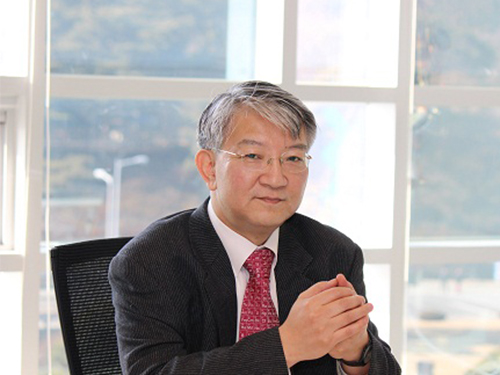 Nature Biotechnology Nominates Sang Yup Lee of KAIST for Top 20 Translational Researchers of 2014
Nature Biotechnology, recognized as the most prestigious journal in the field of biotechnology, has released today its list of the Top 20 Translational Researchers of 2014. Distinguished Professor Sang Yup Lee of the Department of Chemical and Biomolecular Engineering at KAIST (Korea Advanced Institute of Science and Technology) ranked seventh in the list. He is the only Asian researcher listed.
The journal, in partnership with IP Checkups, a patent analytics firm, presents an annual ranking of researchers based on their paper and patent output. The list includes, among others, each researcher’s most-cited patent in the past five years and their H index, a measurement to evaluate the impact of a researcher’s published work utilizing citation analysis. (More details can be found at http://www.nature.com/bioent/2015/150801/full/bioe.2015.9.html.)
American institutions made up the majority of the list, with 18 universities and research institutes, and the remainder was filled by KAIST in Korea and the Commonwealth Scientific and Industrial Research Organization (CSIRO) in Australia.
Globally known as a leading researcher in systems metabolic engineering, Professor Lee has published more than 500 journal papers and 580 patents. He has received many awards, including the Citation Classic Award, Elmer Gaden Award, Merck Metabolic Engineering Award, ACS Marvin Johnson Award, SIMB Charles Thom Award, POSCO TJ Park Prize, Amgen Biochemical Engineering Award, and the Ho Am Prize in Engineering.
2015.08.27 View 12300
Nature Biotechnology Nominates Sang Yup Lee of KAIST for Top 20 Translational Researchers of 2014
Nature Biotechnology, recognized as the most prestigious journal in the field of biotechnology, has released today its list of the Top 20 Translational Researchers of 2014. Distinguished Professor Sang Yup Lee of the Department of Chemical and Biomolecular Engineering at KAIST (Korea Advanced Institute of Science and Technology) ranked seventh in the list. He is the only Asian researcher listed.
The journal, in partnership with IP Checkups, a patent analytics firm, presents an annual ranking of researchers based on their paper and patent output. The list includes, among others, each researcher’s most-cited patent in the past five years and their H index, a measurement to evaluate the impact of a researcher’s published work utilizing citation analysis. (More details can be found at http://www.nature.com/bioent/2015/150801/full/bioe.2015.9.html.)
American institutions made up the majority of the list, with 18 universities and research institutes, and the remainder was filled by KAIST in Korea and the Commonwealth Scientific and Industrial Research Organization (CSIRO) in Australia.
Globally known as a leading researcher in systems metabolic engineering, Professor Lee has published more than 500 journal papers and 580 patents. He has received many awards, including the Citation Classic Award, Elmer Gaden Award, Merck Metabolic Engineering Award, ACS Marvin Johnson Award, SIMB Charles Thom Award, POSCO TJ Park Prize, Amgen Biochemical Engineering Award, and the Ho Am Prize in Engineering.
2015.08.27 View 12300 -
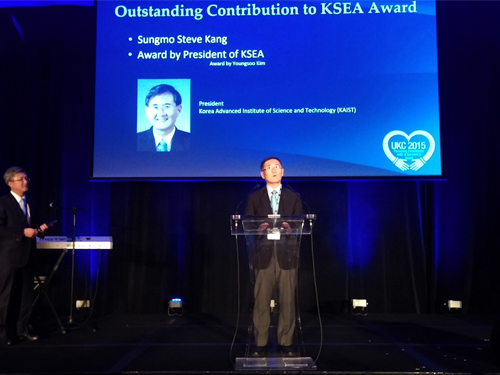 President Steve Kang of KAIST Receives the Outstanding Contribution Award from the Korean-American Scientists and Engineers Association
The Korean-American Scientists and Engineers Association (KSEA), a non-profit Korean professional organization based in the United States with over 6,000 registered members, bestowed upon President Steve Kang of KAIST the 2015 Outstanding Contribution Award.
The award is presented to a person who has made significant contributions to the development of KSEA.
The award ceremony took place during the 2015 US-Korea Conference on Science, Technology, and Entrepreneurship (UKC), which was held on July 30, 2015, at the Hyatt Regency Hotel in Atlanta, Georgia.
The UKC is the flagship conference of KSEA, which takes place every year, and covers science, engineering, technology, industry, entrepreneurship, and leadership. It attracts more than 1,200 participants from the US and Korea. The UKC 2015 was held on July 29-August 1, 2015.
President Kang has participated in UKC conferences over the past few years as a plenary speaker, addressing major issues in science and technology for both nations, and provided generous support for the activities of UKC and KSEA. He also promoted discussions and exchanges of professional knowledge in his field, microelectronics, by organizing fora and symposia.
He addressed the UKC 2015 as a plenary speaker with a speech entitled “Pursuing Excellence with a Servant’s Heart.” President Kang said that good leadership should bring out synergistic contributions from all constituents and achieve excellence under all circumstances. He mentioned one example of good leadership, known as humble leadership, and explained how such leadership played an important role in the development of scientific breakthroughs, such as the world’s premier high-end microprocessor chip sets first produced by his team under extremely high pressure.
2015.08.05 View 8845
President Steve Kang of KAIST Receives the Outstanding Contribution Award from the Korean-American Scientists and Engineers Association
The Korean-American Scientists and Engineers Association (KSEA), a non-profit Korean professional organization based in the United States with over 6,000 registered members, bestowed upon President Steve Kang of KAIST the 2015 Outstanding Contribution Award.
The award is presented to a person who has made significant contributions to the development of KSEA.
The award ceremony took place during the 2015 US-Korea Conference on Science, Technology, and Entrepreneurship (UKC), which was held on July 30, 2015, at the Hyatt Regency Hotel in Atlanta, Georgia.
The UKC is the flagship conference of KSEA, which takes place every year, and covers science, engineering, technology, industry, entrepreneurship, and leadership. It attracts more than 1,200 participants from the US and Korea. The UKC 2015 was held on July 29-August 1, 2015.
President Kang has participated in UKC conferences over the past few years as a plenary speaker, addressing major issues in science and technology for both nations, and provided generous support for the activities of UKC and KSEA. He also promoted discussions and exchanges of professional knowledge in his field, microelectronics, by organizing fora and symposia.
He addressed the UKC 2015 as a plenary speaker with a speech entitled “Pursuing Excellence with a Servant’s Heart.” President Kang said that good leadership should bring out synergistic contributions from all constituents and achieve excellence under all circumstances. He mentioned one example of good leadership, known as humble leadership, and explained how such leadership played an important role in the development of scientific breakthroughs, such as the world’s premier high-end microprocessor chip sets first produced by his team under extremely high pressure.
2015.08.05 View 8845 -
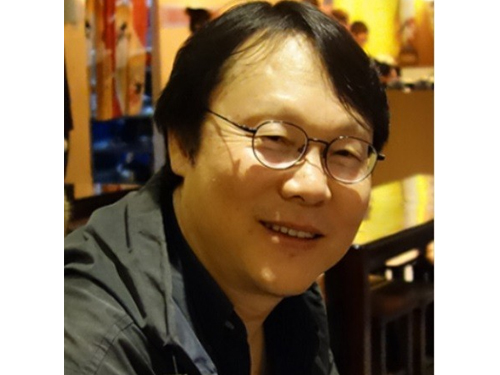 Professor Jeong-Guon Ih Is Appointed the Vice President of the International Commission for Acoustics
Professor Jeong-Guon Ih of the Mechanical Engineering Department at KAIST has been elected to serve as the Vice President of the International Commission for Acoustics (ICA) from June 2015 to the end of 2016. The appointment was made at the meeting of the ICA Board held on June 1, 2015, in Maastricht, the Netherlands.
Professor Ih currently also chairs the Asia-Pacific Acoustics Commission.
Instituted in 1951, the ICA is an academic society that promotes international development and collaboration in all fields of acoustics including research, advancement, education, and standardization. It has a membership of 44 national acoustical societies worldwide and four observer countries.
2015.06.17 View 8112
Professor Jeong-Guon Ih Is Appointed the Vice President of the International Commission for Acoustics
Professor Jeong-Guon Ih of the Mechanical Engineering Department at KAIST has been elected to serve as the Vice President of the International Commission for Acoustics (ICA) from June 2015 to the end of 2016. The appointment was made at the meeting of the ICA Board held on June 1, 2015, in Maastricht, the Netherlands.
Professor Ih currently also chairs the Asia-Pacific Acoustics Commission.
Instituted in 1951, the ICA is an academic society that promotes international development and collaboration in all fields of acoustics including research, advancement, education, and standardization. It has a membership of 44 national acoustical societies worldwide and four observer countries.
2015.06.17 View 8112 -
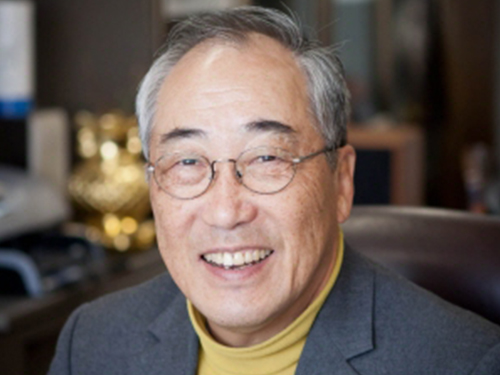 The Acoustical Society of America Names Yang Hann Kim of KAIST the Recipient of the 2015 Rossing Prize in Acoustics Education
The award, given to Dr. Kim in recognition of his contributions to the advancement of acoustics education, will be presented during the 170th Meeting of the Acoustical Society of America on November 2-6, 2015 in Jacksonville, Florida.
The Acoustical Society of America (ASA) announced today that Professor Yang Hann Kim of the Mechanical Engineering Department at the Korea Advanced Institute of Science and Technology (KAIST) was the 12th recipient of the Rossing Prize in Acoustics Education. Dr. Kim is the first recipient selected from a non-English-speaking nation.
The Rossing Prize in Acoustics Education was established in 2003 from a generous gift made to the ASA Foundation by Thomas D. Rossing to recognize an individual who has made significant contributions to the advancement of acoustics education through distinguished teaching, creation of educational materials, textbook writing, and other activities.
During 25 years of teaching and conducting research in acoustics, noise, and vibration at KAIST, Dr. Kim has advised 26 doctorates and published over 200 research papers in journals such as Journal of Acoustical Society of America, Journal of Sound and Vibration, and Journal of Mechanical Systems and Signal Processing. He also wrote two acoustics textbooks for university education, which has been widely read worldwide. The textbook titles are: Sound Propagation: An Impedance Based Approach (Wiley, July 2010) and with the co-author, Dr. Jung-Woo Choi, Sound Visualization and Manipulation (Wiley, September 2013).
Since 2009, Professor Kim has lectured an online course entitled “Introduction to Acoustics,” offering students and the general public throughout the world guidance to study acoustics through the basic concept of impedance, for example, on vibrations and waves.
Dr. Kim will receive the award during ASA’s 170th conference to be held on November 2-6, 2015 at the Hyatt Regency Jacksonville Riverfront Hotel in Jacksonville, Florida, USA.
For the list of previous recipients of the Rossing Prize in Acoustics Education,
see:http://acousticalsociety.org/funding_resources/prizes#rossing
2015.06.04 View 10665
The Acoustical Society of America Names Yang Hann Kim of KAIST the Recipient of the 2015 Rossing Prize in Acoustics Education
The award, given to Dr. Kim in recognition of his contributions to the advancement of acoustics education, will be presented during the 170th Meeting of the Acoustical Society of America on November 2-6, 2015 in Jacksonville, Florida.
The Acoustical Society of America (ASA) announced today that Professor Yang Hann Kim of the Mechanical Engineering Department at the Korea Advanced Institute of Science and Technology (KAIST) was the 12th recipient of the Rossing Prize in Acoustics Education. Dr. Kim is the first recipient selected from a non-English-speaking nation.
The Rossing Prize in Acoustics Education was established in 2003 from a generous gift made to the ASA Foundation by Thomas D. Rossing to recognize an individual who has made significant contributions to the advancement of acoustics education through distinguished teaching, creation of educational materials, textbook writing, and other activities.
During 25 years of teaching and conducting research in acoustics, noise, and vibration at KAIST, Dr. Kim has advised 26 doctorates and published over 200 research papers in journals such as Journal of Acoustical Society of America, Journal of Sound and Vibration, and Journal of Mechanical Systems and Signal Processing. He also wrote two acoustics textbooks for university education, which has been widely read worldwide. The textbook titles are: Sound Propagation: An Impedance Based Approach (Wiley, July 2010) and with the co-author, Dr. Jung-Woo Choi, Sound Visualization and Manipulation (Wiley, September 2013).
Since 2009, Professor Kim has lectured an online course entitled “Introduction to Acoustics,” offering students and the general public throughout the world guidance to study acoustics through the basic concept of impedance, for example, on vibrations and waves.
Dr. Kim will receive the award during ASA’s 170th conference to be held on November 2-6, 2015 at the Hyatt Regency Jacksonville Riverfront Hotel in Jacksonville, Florida, USA.
For the list of previous recipients of the Rossing Prize in Acoustics Education,
see:http://acousticalsociety.org/funding_resources/prizes#rossing
2015.06.04 View 10665